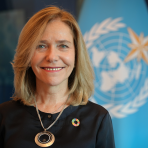Closing remarks during the EW4All Multistakeholder Forum
Friends,
Let me begin with a question that should stay with us:
What good is a warning that comes too late—or never comes at all?
Too many lives are lost because of the silence of systems meant to protect them. These are not just gaps in technology. They are cracks in justice. And they must be closed.
And that’s why my message today is simple:
Early Warnings for All must become more than a goal. It must be a global guarantee.
We’ve seen what’s possible over the past two days.
I want to sincerely thank all the speakers and participants at this first ever Early Warnings For All Multi-Stakeholder Forum. For your energy, enthusiasm, inspiration and innovation.
Special thanks to our co-organizers, UNDRR, for its tireless partnership and leadership and to our partners at IFRC and ITU and across the UN system. To our moderator, Mr. Gavin White, and speakers—thank you for grounding our dialogue in real-world experience and forward-looking solutions. We are deeply grateful for all your support and engagement.
We saw not just discussion, but determination. Not just ambition, but action.
We heard powerful stories. About coastal communities that now have warnings to flee rising tides. About remote villages which now have a lifeline. About megacities which are being given the tools to beat the heat and face the floods.
Let me give just a few examples that show this mission is not only necessary—it’s achievable.
The Climate Risk and Early Warning Systems Initiative—CREWS—has helped improve forecasts and warnings for over 400 million people in least developed countries and small island developing States.
Support from NORCAP and CREWS has helped WMO provide digital infrastructure and training to over half the countries in Africa. This boosted national warning outputs by 2,500%, and added more than 1,000 new observation stations to the Global Basic Observing Network. This is what transformation looks like.
But as we have heard at this Forum. Only 108 countries currently operate multi-hazard early warning systems. That’s not enough. And it’s not acceptable.
We must embed science into political and financial decisions—and strengthen National Meteorological and Hydrological Services at the heart of this effort.
This is not just a technical mission. It’s a human one.
Behind every warning is a family preparing to evacuate. A farmer deciding when to plant and harvest. A government deciding whether to close schools and public transport and open shelters. Real people. Real decisions. Real smiles. Real tears.
WMO’s science and data is an anchor for Early Warnings for All.
But science and data alone doesn’t save lives. Trust does. Timeliness does. Action does.
And that’s why we are gathered here today.
This Forum has reminded us that success depends on something bigger: a whole-of-society movement.
We must co-develop solutions with communities, integrate local knowledge
We must invest not just in forecasting, but in the entire early warning value cycle. As we move into the Global Platform discussions, let us carry forward the commitment of this Forum.
Let us broaden the tent, deepen partnerships, and accelerate the transformation needed to protect every person on Earth.
This year marks WMO's 75th anniversary under the slogan Science for Action.
Let us act – urgently and inclusively, and with the clarity that science provides. Let’s act—together—to close the warning gap for good.
WMO stands ready. And I know you do too. Thank you.
Statement by


